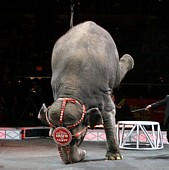477 Years of Suffering
That’s the grand total of years that the 18 elephants used and abused by two of Ringling’s touring units have been forced to endure beatings, chaining, and standing in cramped, sweltering boxcars. If you break that down, Ringling has tormented just these elephants—they have dozens more—for a total of 5,724 months, 24,804 weeks, or 174,105 days.
To put this in perspective, Baby, Sarah, and Banana (three of the elephants who are traveling with Ringling) were forced to perform for the first time in 1968—the year that Martin Luther King Jr. was shot. We’ve come a long way since then—or have we?
Ringling talks a big game about “elephant conservation,” but the reality is that Ringling has actually removed more elephants from the wild than it has bred. Most of the elephants you see pirouetting and standing on their heads in Ringling performances at one point in their lives roamed vast jungles. You might call it Ringling’s other dirty secret (besides that little issue of beating the @#$% out of elephants when they think nobody’s looking).
Ringling’s elephants are also dying faster than they are breeding: At least 26 elephants, including four babies, have died since 1992. Eight were under the age of 40 (which is just about half an elephant’s natural life expectancy of 70 years). Oh, and those babies Ringling does manage to breed are only used to replenish its stocks as other elephants die—they will never be released into the wild—ever.
Pretty depressing, isn’t it? Ringling must be using some kind of new math to make all that add up to “conservation.”
If you follow the jump, you can read about each of the elephants—and the life sentences to which Ringling has condemned them.
Written by Alisa Mullins


